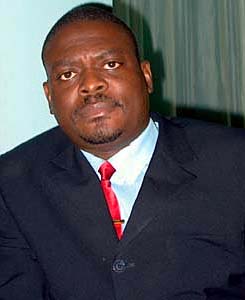Interview with Johnny Paul Koroma
Peter C. Andersen
5 June 2001 - Freetown, Sierra Leone
Sierra Leone Web
Following the violent overthrow of Sierra Leone's civilian
government in May 1997, Johnny Paul Koroma
spent a turbulent nine  months as chairman of the AFRC military junta.
Then, after the junta's collapse in February 1998, he spent nearly twice that time as a prisoner of the RUF's notorious field commander, Sam
"Mosquito" Bockarie, in the country's eastern Kailahun District. These
days, Koroma shows up to his office at Freetown's Miatta Conference Center in a
suit and tie, where as chairman of the government's Commission for the
Consolidation of Peace, he works to encourage reconciliation in a country which
has suffered ten years of civil war.
months as chairman of the AFRC military junta.
Then, after the junta's collapse in February 1998, he spent nearly twice that time as a prisoner of the RUF's notorious field commander, Sam
"Mosquito" Bockarie, in the country's eastern Kailahun District. These
days, Koroma shows up to his office at Freetown's Miatta Conference Center in a
suit and tie, where as chairman of the government's Commission for the
Consolidation of Peace, he works to encourage reconciliation in a country which
has suffered ten years of civil war.
"As I am talking to you now, my commissioners are in Kambia trying to sensitise people on reconciliation," Koroma told the Sierra Leone Web. "That’s very, very important, because they are doing this disarmament now, and ex-combatants have to be reintegrated into society."
While only a few hundred yard from his office, vehicles bearing the insignia of United Nations agencies, non-governmental organisations and the Sierra Leone government jostled for space in Freetown's crowded streets, the former junta leader stressed the importance of cooperation between all of those working to advance the peace process. "We should coordinate our efforts," he said. "If you are competing, that’s an unhealthy competition. The best thing is for us to work together...Then we can achieve lasting peace. Not that I want to say I am the sole person that is bringing peace in this country, no. Peace is something all of us can achieve together."
Looking back five years to his chairmanship of the AFRC, Koroma is still reluctant to describe the junta as a failure. "It was not the junta that failed. It’s everybody failed," he said. "And that is why everybody in one way or the other is responsible for what happened. So once we’ve realised that we’ve made a mistake, now we are correcting it. We are coming together."
Koroma still defends his decision to invite the RUF rebels to join the junta, and he insists that is exactly which the government is doing today. But he now admits that the timing was wrong. "The only thing I can own up to is that we did it prematurely," he said, adding that the 72 hours it took the rebels in the bush to arrive en masse in the capital was too short a time for the two sides to work out modalities for power sharing. "We just called them and it was in a rush," he said. "It was like we wanted just the war to come to an end, you know, so we called them in a rush. That was a mistake. But calling them was not a mistake at all."
Koroma, a born-again Christian since he was jailed in 1996 for allegedly plotting a military coup, says today that because of his faith he has no hesitation in working with his one-time adversaries to bring about peace. "All what has happened, well, God allowed that to happen," he said. "It’s the work of the devil, but God allowed it to happen. So I cannot blame anybody for that – only blame ourselves for the mistake, and we should not allow ourselves to go back to those mistakes." But Koroma, who has frequently apologised for abuses inflicted by his followers on Sierra Leone's civilian population, made it clear that he is not willing to shoulder all of the blame for Sierra Leone's problems. "All political leaders, every politician, everybody I think in one way or the other should come publicly and say ‘we are sorry for what happened’," he said. "Some people are saying ‘well okay, let him apologise. We didn’t do anything -- let him just apologise.' No, it’s everybody. Everybody!"
"Johnny Paul," as he popularly known these days, acknowledged what has been an open secret in Freetown for some time -- that he is considering a try for the presidency in elections scheduled for the end of this year. "I am seriously thinking about that," he said. "I might, but I haven’t completely made up my mind yet." But for now, he said, he wants to concentrate on advancing the peace process. "I don’t discuss that," he insisted. "If I continue to discuss that then I’m inviting people to come and attack me."
